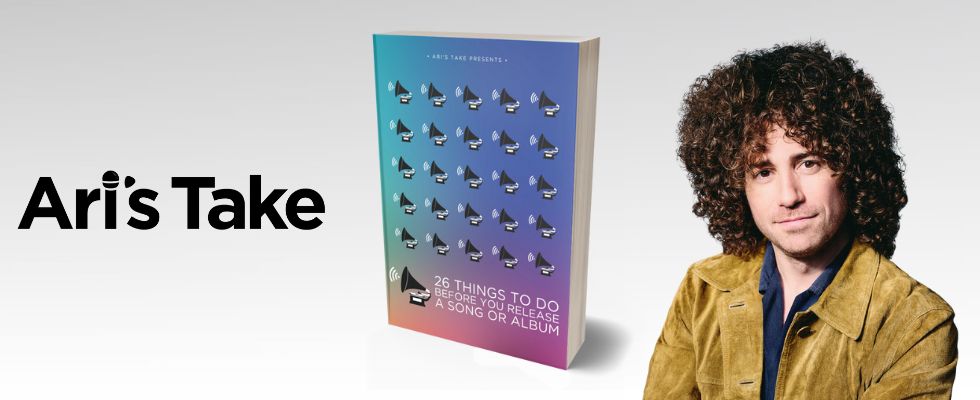Listen on your favorite podcast platform: Spotify | Apple Podcasts | Stitcher | Acast
Joining us this week on the New Music Business is Billboard’s music copyright reporter, Kristin Robinson. In this episode, Ari and Kristin dive deep into one of her latest articles and why it’s more important than ever for artists to properly register and monitor their works.
Read the full article here: How Did Two Unknown Latin Music Operators Make $23 Million From YouTube? The IRS Says They Stole It
04:20 Welcome
06:00 Breaking down the YouTube royalties scam
12:17 The AdRev model
19:26 How the two scammers were caught
30:36 The writing process
34:04 Reactions to the Billboard report being published
38:16 The importance of royalty collection and copyright management
50:31 The slow evolution of the U.S. copyright laws
56:49 Final question
Edited and mixed by Maxton Hunter
Music by Brassroots District
Produced by the team at Ari’s Take
***
This story brings to light another reason why every artist needs to properly register (and monitor) their works on streaming platforms and YouTube. We go into depth in our conversation on how this all works and what you can do about it, but it’s why I’m working on developing an in-depth ATA course on Registration, Royalties and Release so you can make sure everything is completely buttoned up before you put it out into the world. That’s coming in a few weeks.
+How Do Producer and Songwriter Splits Work
We also talked about in our interview how rivals, ex-girlfriends and sexual abusers are taking advantage of the broken copyright law and getting their enemies banned from Instagram, Spotify and YouTube.
It’s real fucked up and the laws are long overdue. This is something I think everyone can agree on.
One artist told me how she paid a photographer for a photoshoot and part of the agreement (in writing) was she could use these photos on Instagram. He then made a sexual advance on her. She did not reciprocate and turned him down. He was so angry by it that he made copyright claims to Instagram that she did not have permission to post the photos he took (even though she did have the permission). Instagram then BANNED HER FROM INSTAGRAM. Her! Not him. Her.
She is a full-time artist and Instagram is her lifeblood – the primary way she communicates with her fans. Instagram ripped her account down without recourse.
See, the completely outdated 1998 Digital Millennium Copyright Act (DMCA) states that anyone can issue a “takedown notice” to a platform if their works have been posted without their permission. The platform is required to take it down and issue a “copyright strike” to the (supposed) infringing party. If the “infringing party” gets 3 strikes, well then the platform is required (by this law) to ban them from the platform. If the platform doesn’t, then it could be held responsible in lawsuits.
So, all platforms (Instagram, YouTube, Spotify, etc) takedown first, ask questions later. Actually they don’t ask any questions. Instagram’s policy apparently is to just remove content, rip the account down and tell the parties to work it out amongst themselves.
So, Instagram is basically telling women: you need to go to your abuser and apologize and play nice and get them (by whatever means necessary) to revoke the claim.
Good job Instagram.
Now this woman I spoke to said she appealed this 6 times and the Instagram rep said she could issue a DMCA counter claim, but then this opens her up to be sued by this guy. Because he will be notified.
She posted about what had happened on Facebook and the photographer had an attorney send her a very threatening letter threatening to sue her for defamation.
This is how women get silenced.
And Instagram is complicit.
Instagram, Spotify, YouTube and every other platform need to do a better job investigating these matters. This is artists’ livelihood.
But moreover, the laws need to change. The 1998 Digital Millennium Copyright Act (DMCA) is outdated. The law was written when the (dial-up) internet was for Craigslist, message boards, and porn. Long before social media. Before streaming. Before YouTube.
This outdated law doesn’t work for anyone anymore. And it is now enabling rival parties (be it ex-girlfriends, rival artists, or in the worst cases, abusers) to take advantage of this law for their own malice.
Believe me, if she gave me permission I would call this photographer out by name and end his career.
But then he would sue her and she’d be buried by lawsuits and she doesn’t want to spend her time in court or her money on legal fees. Understandably.
So what are we supposed to do?
First off, if you have any stories of this happening to you in any capacity, I want to hear about it. I will eventually write a full piece on what’s going on to hopefully shed more light on it and work to get a law changed.
Shoot us an email: info@aristake.com
In the meantime, learn how to properly register your works, get EVERYTHING in writing when working with other parties (producers, co-writers, photographers, engineers, etc). Make sure you have them sign work-for-hire agreements when appropriate, and stay vigilant!
Join the Ari’s Take Academy course Registration, Royalties, & Release. Enrollment closes October 20th.

















